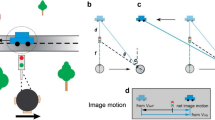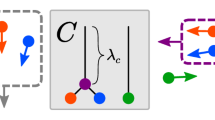Abstract
The movement after-effect (MAE) is caused by inspecting a pattern in which many stimulus elements in the visual field are in coherent movement; after inspection, stationary elements seem to move in the opposite direction. By far the commonest cause of such a retinal stimulus is movement of the observer, not movement of the environment. We suggest here, therefore, that the usual laboratory stimulus for inducing the MAE presents the observer with conflicting sensory cues. The optical input is normally associated with self motion, but other cues such as the vestibular input simultaneously tell the observer that he is stationary. In these circumstances a recalibration of the relationship between optical and other information might occur and we suggest that the after-effect may be at least in part a consequence of this recalibration, rather than being entirely due to a passive fatigue-like process.
This is a preview of subscription content, access via your institution
Access options
Subscribe to this journal
Receive 51 print issues and online access
$199.00 per year
only $3.90 per issue
Buy this article
- Purchase on Springer Link
- Instant access to full article PDF
Prices may be subject to local taxes which are calculated during checkout
Similar content being viewed by others
References
Wohlgemuth, A. Br. J. Psychol. Monogr. Suppl. 1, 1–117 (1911).
Author information
Authors and Affiliations
Rights and permissions
About this article
Cite this article
Harris, L., Morgan, M. & Still, A. Moving and the motion after-effect. Nature 293, 139–141 (1981). https://doi.org/10.1038/293139a0
Issue Date:
DOI: https://doi.org/10.1038/293139a0
This article is cited by
-
Velocity influences the relative contributions of visual and vestibular cues to self-acceleration
Experimental Brain Research (2020)
-
Habituation of visual adaptation
Scientific Reports (2016)
-
Walking without optic flow reduces subsequent vection
Experimental Brain Research (2015)
-
Limited interaction between translation and visual motion aftereffects in humans
Experimental Brain Research (2013)
-
Fore–aft translation aftereffects
Experimental Brain Research (2012)
Comments
By submitting a comment you agree to abide by our Terms and Community Guidelines. If you find something abusive or that does not comply with our terms or guidelines please flag it as inappropriate.



